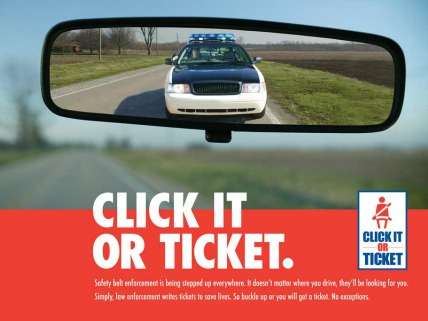ACLU Documents Racially Skewed Enforcement of Seat Belt Laws
An overlooked alternative: no enforcement

According to a new report from the American Civil Liberties Union (ACLU), blacks are twice as likely as whites to be pulled over in Florida for failing to fasten their seat belts. Although Florida survey data indicate that blacks are slightly less likely to buckle up than whites, the difference is only 7 percent, so it does not come close to accounting for the 100 percent difference in seat belt citation rates. [See addendum.] In some jurisdictions, the difference was even bigger: about 200 percent in Orange and Palm Beach counties, 300 percent in Escambia County. The ACLU says "these racial disparities raise serious concerns that law enforcement [agencies] engage in racial profiling when enforcing the Florida Safety Belt Law."
The report analyzes data that state law requires police to report (although the ACLU notes that compliance with that mandate fell from 293 agencies in 2007 to 147 in 2014). The ACLU's main calculation is based on citations per 100,000 people: 1,821 for blacks vs. 970 for whites in 2014. The report also notes that blacks accounted for 13.5 percent of resident drivers but 22 percent of seat belt tickets that year. "If Black people had been stopped and ticketed for seatbelt violations in proportion to their estimated representation among Florida drivers," the ACLU says, "they would have received 20,296 fewer seatbelt citations in 2014."
The ACLU suggests several reforms to address the racial disparity in seat belt stops, including better enforcement of the reporting requirement and investigation of agencies with especially large disparities. Conspicuously missing from the list: repealing the state law that requires people to wear seat belts, or at least the part of it that authorizes "primary enforcement," which lets police stop a car if they suspect the driver or a passenger is not complying. Florida is one of 32 states with primary enforcement of seat belt laws; in the other 18, police need an independent reason to pull a car over, after which they can write a seat belt citation if it is justified.
Primary enforcement of seat belt laws gives police yet another excuse to hassle people who are not violating anyone's rights, yet another pretext for stops aimed at discovering consensual "crimes" such as drug possession, yet another occasion for initiating an encounter that may result in protracted detention, a humiliating search, legalized theft, assault, kidnapping (a.k.a. arrest), or even death. As the ACLU notes, the policy also provides yet another opportunity for racial biases to influence law enforcement. Assuming seat belt enforcement is often a cover for stops aimed at implicating people in drug offenses and/or seizing property allegedly connected to drug offenses, the same factors that make blacks especially likely to be arrested on drug charges may help explain racial disparities in seat belt citations.
Inviting these intrusions, whether racially motivated or not, is especially hard to justify when the aim is stopping people from driving without a seat belt, a self-endangering habit that (like riding a bicycle or motorcycle without a helmet) does not pose a threat to others. Back in 2005, when only 20 states let cops pull over unbelted drivers, I wrote a feature story for Reason that noted the potential for the sort of mischief highlighted in the ACLU report:
As states move toward primary enforcement (which the transportation bill signed by President Bush in August encourages them to do with a promise of extra highway money), seat belt laws may arouse more resentment and concern, especially since traffic stops can lead to further hassles, such as interrogation and examinations by drug-sniffing dogs. Fear of racially tinged police harassment was the main reason New Jersey, the second state to adopt a seat belt law, did not follow New York's lead in allowing primary enforcement, and most states copied the New Jersey model. "Do I think racial profiling is an issue?" says MADD's Chuck Hurley, who lobbied for stricter seat belt laws when he worked at the National Safety Council. "Yes, I do." But Hurley doubts primary enforcement of seat belt laws will noticeably worsen the problem, and he argues that it makes sense as a matter of consistency: If you can be pulled over for a broken tail light, why not for failing to buckle up? One answer is that the broken tail light poses a potential hazard to others, while the unbuckled seat belt does not. But unless they want to repeal existing seat belt requirements, says Hurley, politicians who oppose primary enforcement are left to argue, rather implausibly, that it's "the Maginot Line between enough government and too much government."
Even if you don't object to the paternalism inherent in legally requiring people to use seat belts, you might rationally object to laws that expand a cop's disturbingly broad power to mess with you.
Addendum: As a reader points out, the relevant comparison for assessing racial differences in seat belt citations is the extent of noncompliance among blacks vs. whites. According to the 2014 survey of Florida residents cited by the ACLU, 91.5 percent of whites used seat belts, compared to 85.8 percent of blacks. That means 8.5 percent of whites and 14.2 percent of blacks did not wear seat belts. In other words, black people were 67 percent more likely than white people to ride in cars with their seat belts unfastened. That difference would account for most of the statewide racial disparity in citations, which was 88 percent in 2014. It is harder to account for the much larger racial disparities in places such as Orange, Palm Beach, and Escambia counties, although it's possible the racial gap in compliance rates varies from one jurisdiction to another.
